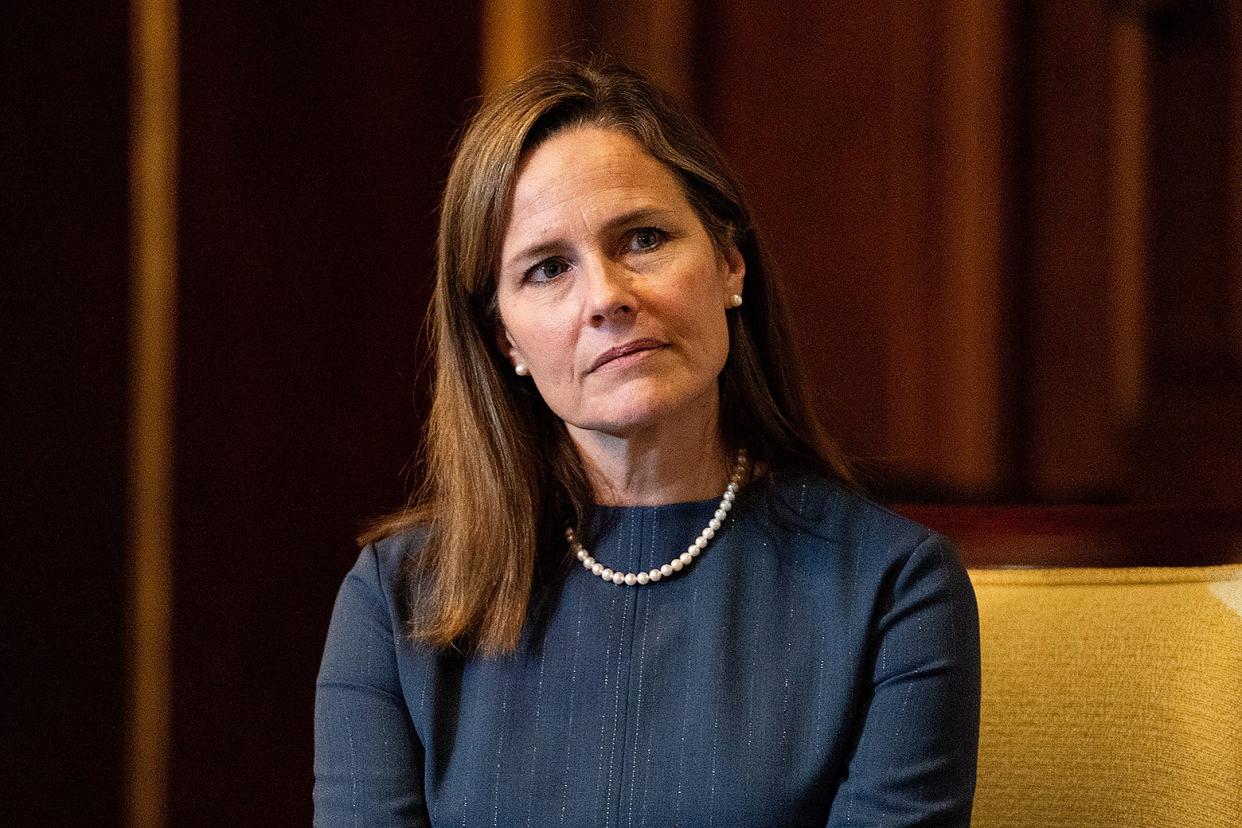Amy Coney Barrett’s Call for a SCOTUS Ethics Code Comes With an Exasperating Rider

- Oops!Something went wrong.Please try again later.
- Oops!Something went wrong.Please try again later.
- Oops!Something went wrong.Please try again later.
- Oops!Something went wrong.Please try again later.
Justice Amy Coney Barrett recently became the second member of the Supreme Court, joining Justice Elena Kagan, to explicitly support the adoption of a SCOTUS ethics code. It would be a “good idea” to adopt a code, she told an audience on Monday at the University of Minnesota Law School, “particularly so that we can communicate to the public exactly what it is that we are doing in a clearer way than perhaps we have been able to do so far.” That was admirable candor, not least because it must have ruffled some feathers among the likely holdouts on the court.
But then Barrett continued with an assurance that there is “unanimity among all nine justices that we should and do hold ourselves to the highest ethical standards possible.” Who was she kidding? Perhaps she had to concede something like that as a matter of politesse, but anyone who has been paying attention knows that Justices Clarence Thomas and Samuel Alito have not been holding themselves to the “highest ethical standards possible.” At best, they have grudgingly adhered to the bare-minimum legal requirements of their job, while flouting anything resembling the highest possible standards. Alito has even bragged of his belief that no institution can hold the justices accountable.
A justice committed to the highest ethical standards would recognize that even the appearance of impropriety is damaging to the legitimacy of the court. That justice would scrupulously follow financial disclosure obligations, carefully reading the rules to ensure compliance, never making the same mistake twice, avoiding feeble excuses, and erring on the side of disclosure whenever there is doubt.
Thomas has done virtually the opposite. He failed to disclose his wife’s employment for two decades, correcting his responses only after the omission was reported in the press. His excuse—that he misread the simple instructions for 20 years—was implausible at the time, yet he has recently reused it twice: once for his failure to disclose a real estate transaction with billionaire Harlan Crow, and again for the omission of bank accounts on his financial reports.
Speaking of Crow, Thomas and his wife, Virginia, accepted decades of luxury vacations and other lavish gifts from Crow and other Republican megadonors, all without disclosure, on Thomas’ dubious theory that cruises to Indonesia and the Caribbean, as well as flights on private jets, were nothing more than “personal hospitality” for which the public had no right to or interest in full information.
Alito’s disclosures have been much the same, with the added twist that he justified omitting a private jet flight to an Alaska fishing resort, hosted by yet another Republican billionaire, by calling the plane a “transportation facility.” He also claimed that the trip fell below the disclosure threshold because his seat “would have otherwise been vacant.”
Thomas and Alito’s view of financial disclosure has been cramped, narrow, and reluctant, but that is not the worst of it. Their approach to recusal has been in blatant disregard of both law and ethics.
On April 25, all nine justices signed a “Statement on Ethics Principles and Practices,” which they submitted to the U.S. Senate Judiciary Committee. Regarding recusal, the statement affirmed that the justices would follow the “same general principles and statutory standards” as the lower federal courts, which adopted the Code of Judicial Conduct in 1973. Moreover, the statement added, a justice “may provide a summary explanation of a recusal decision” by referencing the code. Despite their signatures on the statement, Alito and Thomas have done neither so far.
In a Wall Street Journal interview, Alito actually declared that he did not consider himself bound by the federal recusal statute. He later followed through by denying a recusal request in a contentious case, announcing that it was strictly a “personal decision,” while overtly failing even to mention the federal law or judicial code.
Meanwhile, Thomas’ recusal choices have been, shall we say, questionable under the standard—whether “impartiality might reasonably be questioned”—found in both the federal statute and judicial code. In January, for example, the justice fully participated in a case involving former President Donald Trump’s attempt to block a congressional committee’s subpoena for White House records relating to the Jan. 6 insurrection, even though Virginia Thomas had exchanged numerous texts with Trump’s chief of staff in the days leading up to the attack on the Capitol. Although Virginia had attended the “Stop the Steal” rally on Jan. 6 and had protested the House Select Committee’s investigation, Thomas cast the sole dissenting vote when the court turned away Trump’s request to shield the records.
Thomas did recently recuse himself in a failed appeal by his former clerk John Eastman that sought to bar access to emails relating to his efforts to reverse the outcome of the 2020 presidential election. Like Alito, Thomas made no mention of federal law or judicial ethics in the one-sentence order removing himself from the case. And because Thomas offered no explanation of his reasoning, it is unclear whether the recusal was prompted by his own relationship with Eastman or by Virginia Thomas’ involvement in the election protests.
The Supreme Court remains the only court in the U.S. without a written code of conduct. If Barrett is going to change that, she will have to confront the depressing reality that while some justices do regard ethics as an aspiration, for others they are just a nuisance.

